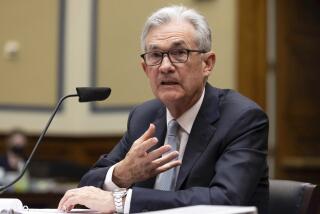Weaker Economy Forecast for Germany : Unification: Experts expect increased unemployment and sluggish growth. But the government brands them too pessimistic.
BONN â Leading economists Monday forecast high unemployment, slower growth and rising inflation in the coming year as a unified Germany grapples with an economy that remains âdeeply divided.â
In their biannual report, researchers at five key economic institutes outlined changes wrought by German unification and world events including the Persian Gulf crisis.
The 68-page report painted a grim picture that Chancellor Helmut Kohlâs government immediately criticized as too pessimistic for what now ranks as Europeâs largest economy.
âEconomic development in Germany will weaken in the coming year,â the report said. Production and demand in what was West Germany will continue to rise, it said, but the effect will be offset by higher spending to rebuild the economy in what was East Germany.
âThe German economy is split,â Heiner Flassbeck of the German Institute for Economic Research in Berlin told a news conference in Bonn. âEastern Germany is undergoing a deep structural crisis with its markets cut off. Western Germany has increased its markets, and the economic upswing will continue.â
However, he said, the eastern region can expect to see signs of a rebound by next summer as the first shocks of adapting to the new free-market system subside.
The report predicted that unemployment will rise by 100,000 in the western part of the country and by 1.1 million in the eastern sector, representing a total of 10% of the work force, up from 6%.
Scores of inefficient and outdated factories and businesses subsidized for decades by East Germanyâs corrupt Communist government continue to fail, as do many small, private firms trying to compete on their own in the free market.
Consumers generally consider western products superior to eastern goods, which are scarcely seen now on store shelves in the five states that made up East Germany.
The economists said there are no realistic short-term solutions to curb unemployment and bankruptcies.
âWhat must collapse must collapse,â said Klaus-Werner Schatz of the Kiel Institute for World Economics.
Analysts have said that unemployment in the eastern sector could reach 4 million, a third of the work force, over the next few years.
Mondayâs report said economic growth in 1991 would be only 1.5% and not the 2% to 3% predicted by Kohlâs conservative government.
Finance Minister Theo Waigel and Economics Minister Helmut Haussmann said the economists underestimated the impact of massive government investment in the eastern region and the overall strength of the national economy.
In a joint statement issued Monday, the two Cabinet members reiterated the governmentâs pledge that taxes will not be raised to pay the staggering cost of unification. They said investment in the eastern area will be at least 60 billion marks ($45 billion) through the end of next year.
âThis, as well as the growing initiative of eastern citizens and the rising involvement of West Germans and foreign firms, will lead to notable improvements and . . . competitive new workplaces,â the ministers said.
The opposition Social Democrats accused the government of âglossing things overâ in order to ensure Kohlâs reelection.
Kohl is considered the front-runner over Social Democratic challenger Oskar Lafontaine, who was one of the first politicians to raise questions publicly about the cost of helping East Germany when the first refugees began flooding across the border last year.
The economic report also said that German exports are lagging because of a slump in important world markets, especially the United States.
âForeign countries are no longer the motor of German economic growth,â it said, adding that events like the gulf crisis pose ânew risks for world economic growth.â
More to Read
Sign up for Essential California
The most important California stories and recommendations in your inbox every morning.
You may occasionally receive promotional content from the Los Angeles Times.










